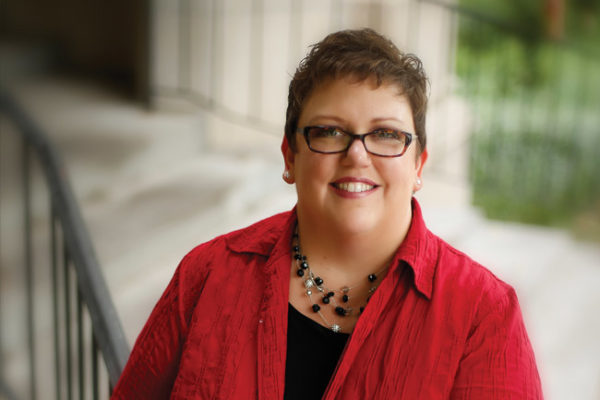Q+A: An Interview with Terri Donaldson
Vanderbilt Nurse recently sat down with Terri Donaldson, DNP, RN, ACNP-BC, director of the Doctor of Nursing Practice program. Donaldson has nearly 30 years of experience in cardiac and critical care nursing, has been on faculty since 2001, and became the DNP program director in 2012. She shares why the DNP is one of the most fascinating and vital pursuits in nursing today.
What is the Doctor of Nursing Practice (DNP)?
The Doctor of Nursing Practice is a practice-focused degree preparing advanced practice nurses to become leaders in bringing evidence-based knowledge into clinical practice. This improves health outcomes for patients as well as contributes to nursing administration and education. We started our program in 2008 with 32 students. Typically, we now enroll 60 new DNP students each year.
Why is the DNP valuable?
The world of health care and nursing is constantly changing. National health care reform has caused more people to look at health care cost and quality. I’ve been in nursing for more than 28 years and can tell you firsthand that nursing is a constantly evolving profession. Many advanced practice nurses find themselves needing to rapidly access and appraise evidence so they can enhance care for complex patients. They also need to be prepared for ever-increasing national concerns about access, quality, cost and safety. To address these issues, the nursing world needs a higher level of preparation for leaders who can design and provide care for diverse populations of patients. The DNP fulfills that demand.
Can you provide some examples?
The DNP broadens your practice to think about entire populations of patients rather than the individual, so you can make a profound difference in health care delivery. A good example is Shawana Crawford who was working as an acute care nurse practitioner in a hepatology and liver transplant practice in Dallas. She wanted to do a quality improvement plan as her DNP scholarly project to determine how to best monitor patients with Hepatitis C, a group who has a high risk for developing liver cancer. She also wanted to ensure that providers in her practice were following national evidence-based practice guidelines. After completing her project and graduating, Shawana’s next step was to implement strategies in her practice using the electronic medical record, to make sure patients with Hepatitis C are appropriately monitored to improve outcomes and decrease mortality.
Is the DNP necessary?
In health care today, it can take as much as 17 years until a new evidence-based approach becomes a standard part of practice. That gap is much too long and does a tremendous disservice to our patients. The DNP graduate is uniquely positioned to close that time gap. He or she has the education to evaluate evidence and manage new knowledge so it can be used in practice and utilize effective tools to support clinical decision making.
What does the nursing profession say?
Several reports from the Institute of Medicine underscore the need for an appropriately trained health care workforce to meet these challenges in the 21st century. Likewise, the American Association of Colleges of Nursing identified the need to change nursing education to meet the demands of an increasingly complex health care system and recommended adoption of the DNP by 2015 as the terminal degree for advanced practice nurses.
How are the DNP and PhD programs different?
The PhD program prepares researchers who discover new knowledge. The DNP graduate translates evidence-based research into practice. So, for instance, someone with a PhD in Nursing may determine a specific intervention helps senior citizens with diabetes. The DNP graduate can translate those findings to his or her population of patients, applying the evidence to day-to-day practice.
Do other health professions require a doctoral degree?
Yes, other health professions like medicine, dentistry, pharmacy, psychology, physical therapy and audiology all offer practice doctorates. Advanced practice nurses need the DNP for the advanced education that it provides and to play an equal role on interdisciplinary health care teams.
What about the DNP and population health management?
The DNP is well poised to look at best practice and optimization of care delivery in the most cost-effective way. A DNP graduate has the knowledge, skills and expertise to influence outcomes. The DNP graduate has an enhanced skill set that builds on master’s education. A great example is our 2013 Founder’s Award medalist, Chaquetta Thomas Johnson, who is the regional consultant for the Louisiana Office of Public Health. Chaquetta did her DNP scholarly work on birth control methods and their relation to sexually transmitted diseases. The result was a more efficient and effective reproductive health model that was implemented statewide in her home state of Louisiana in 2012.
What is different about the Vanderbilt DNP program?
Vanderbilt has a long history in nursing education and innovative methods. We have a practice-active faculty in nurse-managed clinics and a robust infrastructure that supports online learning. We have a clinical practice focus for certified NPs, nurse-midwives, clinical nurse specialists and registered nurse anesthetists, and a system focus for nursing administrators and nursing informaticists.
Faculty-student relationships are very important. Students are very deliberately matched with faculty mentors to meet the students’ interests and guide them through their doctoral education. We strive to create a community where students have a sense of belonging with each other and with faculty. Even though not always face-to-face, students have access to and support from faculty. Our DNP graduates often tell us they are happily surprised at how closely they have connected with their classmates and faculty.
Does Vanderbilt offer distance learning?
Vanderbilt School of Nursing uses a blended distance learning environment which provides content in a variety of formats: courses offered in concentrated blocks of time on campus, online conferencing, and digital video and distributed course delivery methods that allow continued faculty contact between sessions. Other coursework, scholarly interaction and clinical application can take place in students’ home locations so they do not have to relocate or give up employment.
Do most students work while doing the program?
Almost everyone in the program is working in their field, which gives them access to a patient population and practice environment related to their specific area of interest. It also allows lessons learned in any given class or activity to be immediately applied to their current work environment.
Students entering with a BSN must come to campus several times each semester during their MSN-level courses. DNP students are on campus for one week at the beginning of each semester.
What are the toughest classes?
It’s different for everyone. In the DNP program, we challenge students to think conceptually and that can be a new way of thinking compared to the concrete actions—history, exam, plan of care steps—in practice. Also, we spend a lot of time on scholarly writing and have developed an environment to help students augment their skills if they are needed.
What does the DNP mean to nursing?
Today nurses are much more valued in the nation’s health care system than in the past. Advanced practice nurses are exponentially more accepted in the health care delivery model than even 10 years ago. Our new Doctors of Nursing Practice are already infusing innovative knowledge into clinical practice, improving health care outcomes and strengthening nursing management and education. They have a growing role in interdisciplinary teams and will continue making meaningful contributions to the professional practice of nursing.
What is compensation like for a DNP?
DNP graduates may stay in their current jobs, but find themselves offering different contributions. This often creates opportunities for advancement to other positions that may increase earning potential. One recent example is John Savage, a CRNA, who graduated from the DNP program in 2012. His work in standalone surgery centers was directly related to things he was learning and implementing into his workplace. He was promoted even before he graduated.
What have you learned about the DNP over the last five years?
We are constantly learning from our students. We started with a full-time only program that lasted five semesters. We learned that students wanted a part-time option and they wanted elective courses. So we restructured the curriculum within the same credit hours. Now students have opportunities to take electives and to have either a full-time or part-time program of study.
Each student must complete a scholarly project as part of their curriculum, and we continuously evaluate that process to make sure students are getting the best outcome from their educational experience. We consistently review our processes so we can continue to improve.
What do you want everyone to know about the Vanderbilt DNP program?
We have a high standard of excellence and expect nothing less from our students and ourselves. We offer a strong community. Students are not here alone, and the goal of the faculty is the success of every student.
— by Kathy Rivers








